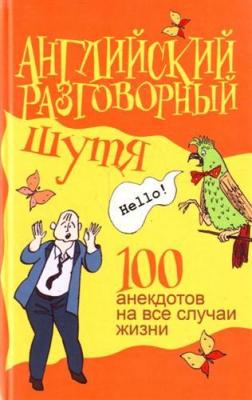Английский разговорный шутя. 100 анекдотов на все случаи жизни. Отсутствует
Читать онлайн.| Название | Английский разговорный шутя. 100 анекдотов на все случаи жизни |
|---|---|
| Автор произведения | Отсутствует |
| Жанр | Иностранные языки |
| Серия | |
| Издательство | Иностранные языки |
| Год выпуска | 2010 |
| isbn | 978-5-17-064604-3, 978-5-271-26535-8 |
Study the words and expressions given below:
confession признание
couple пара
honeymoon медовый месяц
edge край
bathtub ванна
smelly пахучий, вонючий
to stink вонять
to manage удаваться, преуспевать в чем-л.
to date зд. встречаться до брака
meanwhile тем временем
breath дыхание
to court ухаживать
gently мягко
to climb забираться
hers ее
to keep sth from sb скрывать что-л. от кого-л.
to be bound быть вынужденным
to find out обнаруживать
sooner or later рано или поздно
to be lucky быть удачливым
as soon as как только, так…
to pluck up enough courage собраться с духом
So have I. И я тоже.
1. Answer the questions to the text:
1. Where was the husband sitting?
2. What did he worry about?
3. Guess how he had managed to keep his socks as well as his feet away from his would-be wife while they were dating?
4. Where was the wife sitting?
5. How long would it take the man to learn everything about his wife's breath, she thought?
6. Why did the man think that his wife had eaten his socks?
2. Fill in the blanks with the words from the text:
1. A young couple _______ on their honeymoon.
2. How can I tell my wife that my socks _______ stink?
3. I've _______ to keep it from her while we were dating.
4. I've been very _______ to keep it from him.
5. He's _______ to find out.
6. How do I tell him _______?
7. Darling, I've a _______ to make.
8. So have I, _______.
3. Match the two parts of each sentence:
4. Match the words and expressions in the left column to those in the right one:
5. Translate from Russian into English:
1. Рано или поздно она вынуждена будет обнаружить это.
2. Тем временем жена сидела в постели.
3. Мне удавалось делать это, пока мы встречались.
4. Как мне сказать ему об этом мягко?
5. Муж наконец собирается с духом.
6. Он забирается к своей жене, обвивает ее шею своей рукой и говорит.
7. Я тоже, любовь моя.
В предложении A young couple were on their honeymoon… подлежащее, выраженное существительным в форме единственного числа, согласуется со сказуемым, выраженным глаголом во множественном числе.
Проверьте свои знания согласования подлежащего и сказуемого в английском предложении. В случае необходимости используйте грамматический комментарий (раздел 8).
6. Choose the appropriate form of the verb:
1. The husband, as well as his wife, (was, were) _______ in the hotel.
2. It (was, were) _______ the young couple who rented the apartment.
3. Both the husband and the wife (was, were) _______ bound to find it out.
4. Everyone in the house (know, knows) _______ that they have left.
5. Both (was, were) _______ afraid to confess their secrets to each other.
6. A pair of his socks (was, were) _______ lying on the table.
7. Neither my wife nor her relatives (know, knows) _______ that my feet stink.
8. The number of married couples in our hotel (is, are) _______ growing.
9. Honeymoon Jokes (is, are) _______ the most funny section of the book.
В предложении And she says, «So have I, love»… используется краткая форма выражения солидарности с предыдущей репликой диалога. Таких форм – положительных и отрицательных – существует несколько.
Проверьте свои знания данных форм, при необходимости обращаясь к грамматическому комментарию (раздел 9).
7. Fill in the blanks with appropriate forms. Follow the directions given:
Model:
1. We were on our honeymoon. (They – so): So were they.
2. The husband wasn't sitting in the bathroom. (I – neither): Neither was I.
1. I've got really smelly feet. (they – too)
2. My socks absolutely stink. (mine – also)
3. I didn't manage to keep it from her. (we – either)
4. We weren't dating. (they – neither)
5. I've been very lucky to keep it from him. (she – so)
6. The husband has finally plucked up enough courage. (I – so)
7. He
